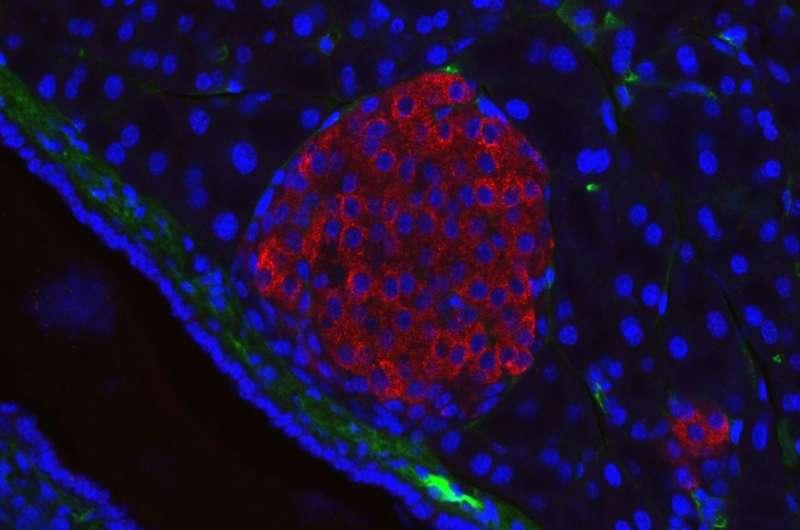
Researchers from Queen Mary University of London, have identified a protein that may represent a novel therapeutic target for the treatment of pancreatic cancer. Using this protein as a target, the team successfully created a CAR T cell therapy—a type of immunotherapy—that killed pancreatic cancer cells in a pre-clinical model.
CAR T cell therapy is an immunotherapy that has shown great promise for the treatment of some blood cancers; however, the treatment of solid tumors using this therapy has proved very difficult. One barrier to success is toxicity in tissues other than the cancer because most of the proteins currently used to target CAR T cells to pancreatic cancer cells and other solid tumors are present in low levels on other normal tissues, leading to toxic side effects.
In this study, published today in Clinical Cancer Research and funded by the charity Pancreatic Cancer UK, the team identified a protein called CEACAM7 that may represent a safer treatment target for the development of therapies against pancreatic ductal adenocarcinoma (PDAC), the most common type of pancreatic cancer.
By using a specialized technique called immunostaining, the team examined a panel of human PDAC samples, and normal tissues for the presence of CEACAM7. A large subset of PDAC samples tested expressed CEACAM7, but the protein was undetectable in a panel of normal tissues including tonsil, lung, liver, and prostate, suggesting that CEACAM7 may be an ideal target for CAR T cell development against pancreatic cancer.
To determine the potential of CEACAM7 as a treatment target, the team developed CAR T cells targeted to CEACAM7 and applied these to PDAC cell lines as well as a preclinical model of PDAC. The CAR T cells effectively targeted the CEACAM7-expressing cells in PDAC cell cultures, and eliminated cancer cells in a late-stage preclinical model of PDAC.
Professor John Marshall from Queen Mary University of London who led the study, said: “This is an exciting development. Finding that CEACAM7 allows us to kill pancreatic cancer cells specifically with CAR T cells while having no significant toxicity in non-tumor tissues, gives us hope that this strategy could be effective in the future. It is also possible that other types of immune-based therapies could be directed to CEACAM7 for the treatment of pancreatic cancer.”
Dr. Deepak Raj, postdoctoral researcher and first author of the study, said: “As CEACAM7 is a poorly studied protein thus far, we were excited to find that it appears a promising CAR T-cell target on pancreatic cancer. It would be important to assess a larger number of antibodies against CEACAM7, not only to generate and test a larger panel of CAR T cells that may have increased efficacy against pancreatic cancer, but also to more conclusively rule whether low levels of CEACAM7 are present in normal tissues.”
How does CAR T cell therapy work?
CAR T cell therapy uses immune cells (called killer T cells) from the patient’s blood, which have a critical role in the immune response. Killer T cells are first isolated from the patient’s blood and modified in the laboratory to express special protein receptors on their surface, called chimeric antigen receptors (CAR), creating CAR T cells. The CAR protein allows the CAR T cells to recognize a specific protein on the surface of cancer cells. CAR T cells are multiplied in the laboratory and then re-injected back into the patient where they recognize and kill cancer cells that have the target protein on their surface.
In this study, the team made a new CAR using part of an antibody to CEACAM7 from collaborator Professor Brad Nelson (British Columbia, Canada). They then modified killer T cells to present this new CAR protein on their surface that recognizes and binds to CEACAM7, directing the killer T cells to kill only cells with CEACAM7, and these seem to be only pancreatic cancer cells.
Challenges in the treatment of pancreatic cancer
Pancreatic ductal adenocarcinoma (PDAC) is the most common type of pancreatic cancer and has the lowest survival rate of all the common cancers, as only about 7% of those diagnosed with this cancer type in the UK survive their cancer for 5 years or more. Diagnosis often comes too late due to a lack of definitive symptoms, by which point surgery to remove the tumor—which offers the greatest chance of a cure—is not possible. There is an urgent requirement for new and more effective targeted therapies.
Chris Macdonald, head of research at Pancreatic Cancer UK said: “These findings are very encouraging and offer real hope that a new, innovative immunotherapy treatment for pancreatic cancer is on the horizon. For the first time a distinct and specific target protein for pancreatic cancer cells has been identified and, crucially, the brilliant team at Barts have shown that by focusing on it, they can destroy the cancer without damaging healthy tissue. This has never been done before in pancreatic cancer and marks an important step towards a desperately needed new treatment option, which could be both more effective and have fewer side-effects for patients.
Source: Read Full Article
